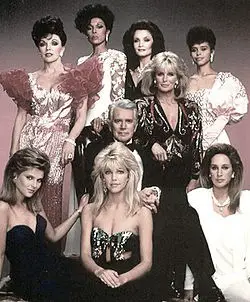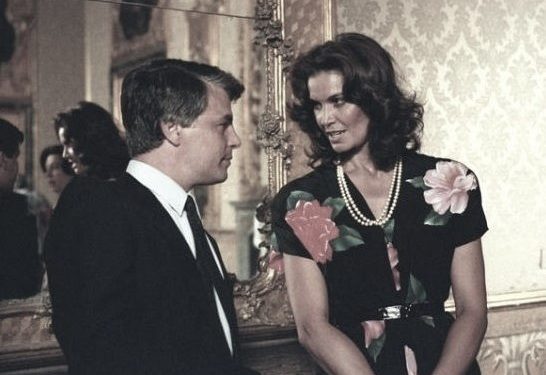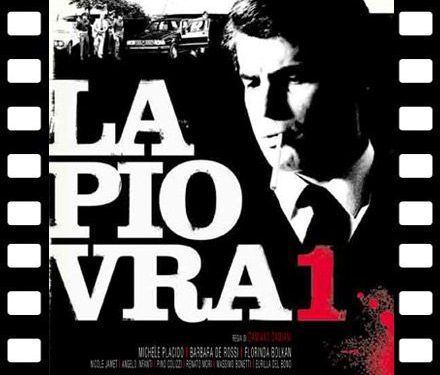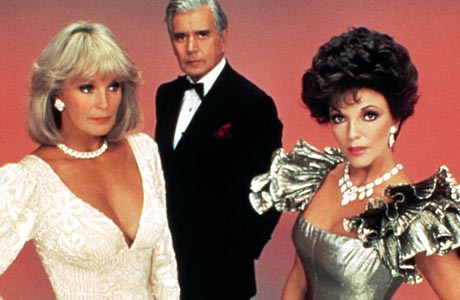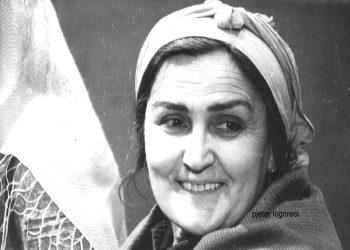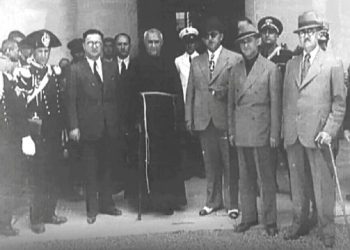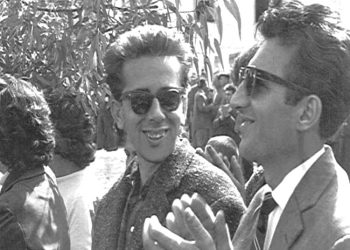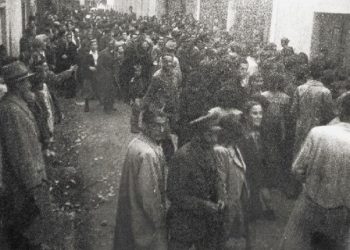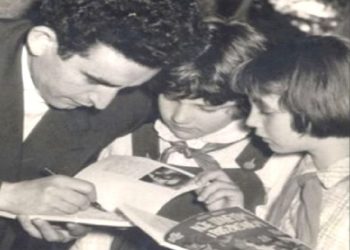From Uvil Zajmi
Memorie.al / From Eastern films such as “Captain Klos” to “Every Kilometer”, then “Izaura”, “Oktapod”, there were some that conquered the Albanian television screen in the 80s. Above all “Dinasty”, the story of passionate love that was followed secretly in groups, families every Monday evening. Not to forget, “This is America” and “Last Tango” with Marlond Brando and Maria Shnaider. Do you remember the TV series “Dinasty” and its characters, such as: Blak, Kristli, Adam, Felloon, Steven, Amanda and Alexis? The impact that the film injected into Albanian families, who anxiously followed the events that the famous American telenovela in the 80s and 90s offered endless surprises, attractive scenes, situations and seductive moments? How did they experience, what did they discuss and how did they comment on the intrigues, infidelities and sensational loves, where the protagonists were the members of a well-known New York family? How the houses and apartments of the time were transformed and improvised into small cinemas, when for many years every Monday evening, groups, relatives, neighbors gathered in secret and thanks to the cans watched in black and white or in color the episodes broadcast by the second channel of yugoslav television? How did the American series provoke the explosion of forbidden love even in Albania by watching the events of Dynasty?
On Albanian Radio Television, television products from the East…!
With serial television films broadcast by the only television channel, such as RTSH, the Albanians have been a little acclimatized, since in sporadic cases some such films were shown, always products of foreign countries, since for a production of local cinematography, not even was about.
So at the beginning of the 70s, when the Albanian Radio Television started from experimental broadcasts and switched to a stable television with a single channel, together with the televisions produced by the URT (Radio Television Factory in Durrës), the show began of some serials with permitted subjects followed by avid television audiences.
Eastern ones dominated mainly, such as: “In every kilometer”, “Captain Klos”, “Four Tankers”, “The Decision”, then “Giuseppe Verdi”, “Zhan Kristof”, to come in the 80s-90s, which are remembered with the famous films “Izaura” and “Oktapodi”. Always translated and previously checked by senior state officials, so that no scene, deviation or even the smallest detail, outside the permitted political-social contours, escapes!
The movie “Izaura”, great impact, name preference of the time
It is the first, the longest, and the most popular series by Albanians, broadcast by Albanian Radio-Television, in the mid-80s. “Izaura” produced by the Brazilian company “Rede Globo” in 1976, is considered one of the most famous telenovelas and according to a survey by a serious company, it is the most sold and dubbed television production, broadcast in 130 countries around the world. . In Russia it became so popular that the Portuguese word “fazenda” (farm) began to be used in everyday language and communication.
Based on the novel by Bernardo Guimaraes, with a screenplay by Gilberto Braga and directed by Herval Rossano, performed by Lucelia Santos and Rubens De Falcon, (in the roles of Izaura and Leoancio), the telenovela with 100 very exciting series is based on the story of a white slave and her relationship with boss Leoncio, who returned from Europe, abandons everything just for love with Izaura.
In Albania it has been followed with great interest, by every age and every day of the week when it was broadcast driven by events, curiosity, very entertaining music, few people were walking on the streets, as you could find everyone stuck in front of the screen. So great was his influence in our country, that the name had an extraordinary attendance for newborns, some of them the parents gave the name, Izaura!
La Piovra, “Octopus” with Commissioner Katani…!
While “La Piovra”, (The Octopus) an Italian television product with ten mini-series had an extension from 1984 to 2001. With directors Damiano Damiani, F. Vançini, L. Perelli and G. Batiato and Ennio Morikonen, as music formular, it was seen by 80 countries of the world with an extraordinary audiovisual flow, including Albania, whose series were broadcast with translation by public television, and were followed with interest, curiosity and anxiety until its last episode.
Starring the police commissioner Korrado Katanin, played by Mikele Plaçido, the banker Tano Karridi played by Remo Zhirone, Patricia Miliardet, in the role of prosecutor Silvia Konti, Florinda Bolcan, in the role of Olga Kamata, Barbara de Rosin, in the role of Titi and the characters others such as Antonio Espinoza, Terrazini, etc., the film offered very strong emotional scenes and moments, which had a shocking impact on and for the Albanian television audience.
The multi-series dealt with the topic of the Sicilian mafia and a police commissioner who tried to oppose it, but died alone along with his family. So great was the effect of the film around the world that in Moscow during a visit of Michele Placido, a group of supporters of the series and the actor asked the government that: if Catani-Placido was not safe in Italy, to guarantee his stay in Moscow, the events of the Italian series had so much influenced and influenced the mass of Russian television viewers.
Great desire, but limited opportunity
Together with the serial television films shown by the Albanian Radio-Television, passionate, curious and maniac Albanians also watched those series broadcast by foreign channels, using and trying all the ways to watch them, although the forms and possibilities were few. , limited and prohibited in Albania.
Favored were those families, individuals, high-ranking officials, embassies, government officials and bureau members who owned a television of foreign brands, brought from abroad, that had the UHF group inside the television, a device that guaranteed reception of low frequencies. Similarly, some coastal cities such as Shkodra, Lezha, Durrësi, Kavaja, Fieri, Vlora, which in the summer allowed to catch the television waves of Italian stations. Otherwise, the famous jugs would be improvised…!
First contact with American serials
The first contact, but the one that connected Albanians with the American television series for years, was “Dinasty”, although Dallas and Capitol were equally famous at the time, some of which continued indefinitely. In particular, “Dinasty”, which had an effect and systematic follow-up for many years by TV viewers, mainly in the capital but also in the districts, starting from 1984 to 1990.
It has been a strong communication with both the events and the characters that “Dynasty” offered to viewers in all the countries of the world where it was shown during the span of a decade. Such is the fame of “Beautifull” (broadcast by TV Klan), even the well-known director, Vera Gravbocka, brought to Tirana in one of her shows, the actor Ronn Moss, the film’s Ridge, one of the protagonists of series without limits and events such as “Beautifull”.
“Dinastya”, with 220 series, infinity of several years…!
“Dinastya”, long with 220 series, started on January 12, 1981 in the United States of America and continued until May 11, 1989. In the USA it was broadcast by ABC television, with Esther Shapiro, as author, the series had 57 screenwriters, 35 directors, 1,500 actors and 8 music formulas.
In a short time, his broadcasts began to appear in every country of the world, massively including Europe. In the first season accompanied by a few series, the response was not great, but everything would change in the following years when “Dinastya” will gain a lot of fame and will be highly followed all over the globe.
In Italy, after the creation of Mediaset on January 4, 1982, it was ‘Rete 4’, since September 15 of that year it started broadcasting every Wednesday and Friday at 14:00. Although with a delay in years, time and episodes, the first contact after which the Albanians began to follow him, we record in 1984, when the series “Dinastya” began to be broadcast on the second UHF channel of Yugoslav television (Belgrade).
Very provocative scenes
A soap opera where the focus is on the life of a family, with love intrigues within it. A rich and successful family in the oil business, where the main protagonists are Blake Carrington, Krystle, the former secretary, his wife and children of which Adam turns out to be missing after a kidnapping. The characters of the series are also Fallon, Steven and Amanda, hidden by him with his first ex-wife, Alexis.
In separate episodes, the series is involved in the conflicts between two large corporations, “Denver Carrington Blake” and Alexis ‘ColbyCo” as well as scenes, infidelities and passionate loves involving the characters. “Dinastya” records for the time the most favorite television series in the Top 30 shows, during the eight seasons that it was broadcast, with an audience of 21.2 million viewers per episode.
Blake Carrington starred in 217 episodes; Linda Evans as Krystle Carrington in 209; John Collins as Alexis Carrington Colby in 204; Gordon Thomson as Adam Carrington in 182 episodes; John Jemas as Jeff Coltby in 168; Michael Nader as Dex Dexter in 151; Jack Coleman as Steve Carrington in 149 and Pamela Anderson as Fallon Carrington Colby in 88 episodes, etc.
Canoches, inventions of the time
The film has been followed with great interest and passion, although in secret, since it is about the mid-80s – ’90s. The series was broadcast every Monday on the second UHF channel of Yugoslav television, and you had to have a foreign brand TV to watch it. But, precisely in that period, the famous hand-crafted cans appeared on the scene by engineers and radio-technicians of televisions, which found a great use and spread as the only ones that offered the reception of low-frequency television signals, especially for Tirana.
Such a device (with the shape of a “Partizani” package of those years) cost from 2,500 to 3,500 lek (old). They were traded clandestinely, secretly with friendship, recognition and recommendations to friends, colleagues, family and trusted people.
The canister was technically connected to “Butrinti”, “Iliria”, “Adriatik” or “Dajti” televisions, which did not have this device, as it was removed at URT (Radio Television Factory in Durrës), when they came from Yugoslavia adapting the Albanian signal without the UHF channel for the market.
A ‘BF 139’ transistor, a diode and a sheet metal almost as big as a pack of cigarettes, were the components of the legendary “can” that guaranteed the viewing of the second Yugoslavian channel and the Italian ones during the summer without any problems.
The famous buzzer did not interfere on this frequency. In order to have an even stronger signal, the varak was used, which was placed on the part of the cable inside the house, moving it up and down until a good signal and picture was obtained. The antenna with small elements had to be directed from the north, which was also a big problem, since the neighborhood knew what one was used for.
21.00 all Albanians in front of the screen…!
The series was broadcast every Monday at 21.00 and Albanians who are passionate about “Dinastya” can be found sitting in front of the television at this time of the evening. Family and neighbors, relatives in groups, lovers of him, the actors, and the events were looking forward to Monday’s dinner and the beginning of the new episode that lasted until the 50th minute.
Although, on Mondays, the Sports Section was broadcast on RTSH, which dealt with the long-awaited sports events and followed by sports enthusiasts as the only one for the time, the battle in the family to choose the series or the sports section was great, since it was a television. There was a change in the schedule as the sports column started at 21.30, a little later than “Dinastya”. However, families, seniors, young adults, children were occupied and engaged to watch and be entertained by the behind-the-scenes and surprises of “Dinastya”.
With benches like in the cinema and the role of the translator
Although forbidden to be watched openly and in an organized manner, during the years of its broadcast during the period of the communist regime of Enver Hoxha, “Dinastya” was watched intensively and systematically by Albanians, until its last episodes. Even turning the houses, that small room, the narrow apartment, the family environment into improvised cinema halls, where there was no shortage of benches for the neighbors, the newcomers to sit.
Since the series was spoken in English, and it was not dubbed, but with subtitles in the Serbo-Croatian language that made it difficult to understand, this is where the translators came into play, and necessarily one of the attendees had to understand and at the same time translate it what was said, how the event continued, or the scenes offered by the next series.
The translator was extremely important without which the events were only guessed without understanding anything, but even this was still a way of following the series. Then, silently, without noise, everyone would return to their home, to see each other again after a week at the movie theater in pursuit of the next episode.
English, the language forced by “Dinastya”
Following the series was born as a coincidence, and its attendance began to increase after every Monday. His influence was great on all old and new admirers. Fashion, clothing, the beauty of the actors, was one of the ways of communication that brought Albanians closer to the continent across the Atlantic.
In the space of an hour, fantasy, desire, dream, everything, moved to the United States of America, to that American family to the characters of the series that became very popular in Albania as well. In order to follow the series well, “Dinastya” had a great influence on the intensive learning of the English language, but also the Serbo-Croatian language, for which the most favored were those who had studied Russian at school in the 60s, or knew the Russian language, as it helped them understand something in the accompanying subtitles of the series.
Even the Albanians as in “Dinastya”: Secret love…!
Especially with the love scenes, the show of the series teased and influenced the preferences, even the passionate loves of Albanians. Watching the series in the community, in groups of friends, family and neighbors, had its own effects, especially in secret love relationships, whether married or single, regardless of age. The events of the series pushed or harassed boys, men and women, towards another “clandestine” preference and relationship, forbidden and secret.
To know the continuation of the series, the fate of the characters was a privilege, but there were few who could have information about future events. It was spoken and discussed in close circles, and one more detail came from students, or family members who had their people in Italy, where the telenovela was many series before the ones broadcast by Yugoslav television, or in the spring-summer period, those who watched the channels Italian along the coast, as in Durrës and Vlora.
The greatest interest was mainly related to the sentimental, surprising and passionate loves that the script had prepared. Especially with love scenes, the show of the series teased and influenced preferences, up to passionate and sentimental love. Watching the series in the community, in groups of friends, family and neighbors, had its own effects, especially in secret love relationships, and the events of the film pushed or harassed boys, men and women for another “clandestine” preference and relationship prohibited and in secret.
“This is America”, another watched series…!
Although for many years, every Monday evening had turned into a systematic ritual, and the series was followed in secret, the state with its structures, mainly with the “active” Neighborhood Front in such cases, remained silent.
Although they were very informed in detail about the passion of families and individuals for the American series, knowing well how it worked or how they gathered to watch the movie “Dinastya”, together with the ways and forms they used, up to the famous can, as well as the antenna with small elements that must have been directed from the north, from the side of the communist regime, hesitated to react, hit individuals or families.
Although we are still in the time of dictatorship, it is no longer at its extreme limits for striking power; this is also due to the fact that Enver Hoxha has passed away. Thus, the state itself seemed to have given a silent ‘OK’ to watch the movie “Dinastya”, since nothing could be hidden when it came time to watch the episode or its conclusion, when the viewers of “Dinastya” were scattered in the apartments of them, creating perhaps a little confusion, noise, even though it was moved on the tip of the fingers.
Then the next day, or during the week, discussions and comments about the series were inevitable, in groups, workplaces, students, schoolchildren, intellectuals, athletes, everywhere and from anyone. Even with great interest, the film had already entered the families of the governors, heads of the Albanian state, all sitting in front of an “Iliria” or “Butrinti”, with a masked canoe, waiting for “Dinastya”.
After the 90’s, everything came to an end as along with the changes the system underwent, the interest in the series was lost. For Albanians, the United States of America, along with “Dinastya”, was not impossibility, since many of them were lucky enough to travel, live and work there. “This is America” (the famous short-lived film that was shown some Thursdays in the late hours of the night, (yes from the second Yugoslav channel in the mid-80s-90s), was no longer a dream of prohibited, but a more tangible reality.
At midnight for “Last Tango…”!
In addition to the serial films watched and attended always in complete clandestineness, there are also some others, even sensational, but not serials, including “Last Tango in Paris” which was watched with great passion. Even today, the capital’s “nostalgic midnights” still remember Brando’s well-known expression in the role of Pauli, addressed to Maria Schneider, in the role of Jeanne: “Quo vadis baby”?
The events take place in Paris in the 70s and the Italian production of 1972 tells the story of a middle-aged man, in a situation of despair, who meets a young girl in an empty apartment, with whom he begins immediately sexual relations, an unreal relationship that has a tragic end.
Due to the strong impact caused by a large number of erotic scenes, a scandal broke out; the film was censored and processed. Driven by curiosity that was beyond the imagination, the fame of the actors and the hype that accompanied it, “Last Tango in Paris”, with Marlond Brando and Maria Schneider and directed by Bernardo Bertolucci, informed earlier, that night Tirana was buzzing and the interest was overwhelming.
Broadcast in the early hours of the morning on the second channel of Yugoslav television, it was watched in complete secrecy, with the lights off, the windows with dark blankets and the voice low and silent. The next day, in schools, students, work centers, in youth groups, infinity of discussions have accompanied the film, although we are in total isolation and comments on such events are dangerous.
In the meantime, despite the media noise that engulfed the entire world of cinema, “Tango” had extraordinary success, as one of the films with colossal viewership and economic income. In 2002, the American Film Institute ranked it 48th in the list of the 100 best romantic films of all time. Memorie.al




